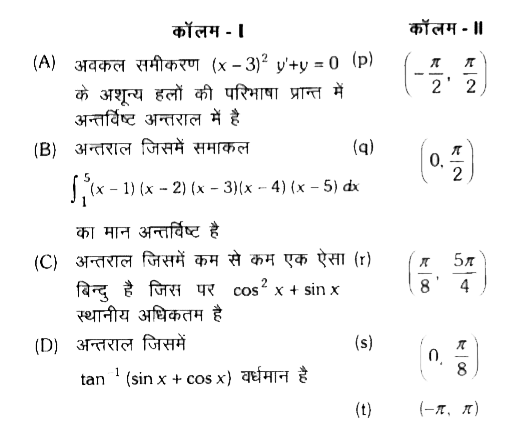यदि cosx=1√1+t2 और siny=t√1+t2, तो dydx=
−1
1−t1+t2
11+t2
1
The correct Answer is:D
Step by step video, text & image solution for यदि cosx=(1)/(sqrt(1+t^(2))) और siny=(t)/(sqrt(1+t^(2))), तो (dy)/(dx)= by Maths experts to help you in doubts & scoring excellent marks in Class 12 exams.
Updated on:21/07/2023Topper's Solved these Questions
- अवकलन तथा अवकलज के अनुप्रयोगBOOK - ERRORLESS HINDICHAPTER - अवकलन तथा अवकलज के अनुप्रयोगEXERCISE - MULTIPLE CHOICE QUESTIONS(प्रतिस्थानपन द्वारा अवकलन, उच्च कोटि के अवकलज )
92 Videos
- अवकलन तथा अवकलज के अनुप्रयोगBOOK - ERRORLESS HINDICHAPTER - अवकलन तथा अवकलज के अनुप्रयोगEXERCISE - MULTIPLE CHOICE QUESTIONS (आंशिक अवकलन )
10 Videos
- अवकलन तथा अवकलज के अनुप्रयोगBOOK - ERRORLESS HINDICHAPTER - अवकलन तथा अवकलज के अनुप्रयोगEXERCISE - MULTIPLE CHOICE QUESTIONS (एक बिन्दु पर अवकलज,मानक अवकलज)
186 Videos
- अवकल समीकरण BOOK - ERRORLESS HINDICHAPTER - अवकल समीकरण EXERCISE - JEE Advanced ( Matrix Match type questions )
3 Videos
- केन्द्रीय प्रवृत्ति के मापBOOK - ERRORLESS HINDICHAPTER - केन्द्रीय प्रवृत्ति के मापEXERCISE - Jee Advanced (Reasoning )
2 Videos
Similar Questions
यदि y=sin(2sin−1x), तो dydx=
View Solutionयदि u=log(x3+y3+z3−3xyz) तो (ϑuϑx+ϑuϑy+ϑuϑz)(x+y+z)=
View Solution2f(x)=f'(x) एवं f(0)=3, तब f(2)=
View Solution
View Solutionकथन - 1 : प्रथम n सम धन पूर्णांकों का प्रसरण n2−14 है।
कथन - 2 : प्रथम n धन पूर्णाको का योगफल n(n+1)2 और प्रथम n धन पूर्णांको के वर्गों का योगफल n(n+1)(2n+1)6 है।
View SolutionIf ex=√1+t−√1−t√1+t+√1−tandtany2=√1−t1+t ,then dydx at t=12 is (a)−12 (b) 12 (c) 0 (d) none of these
View Solutionif x=sqrt((1-t^(2))/(1+t^(2))),y=(sqrt(1+t^(2))-sqrt(1-t^(2)))/(sqrt(1+t^(2))+sqrt(1-t^(2))) then (dy)/(dx)
View Solutionयदि ex=√1+t−√1−t√1+t+√1−t व tany2=√1−t1+t,t=12 पर dydx=
View SolutionIf x=sin−1(t√1+t2),y=cos−1(1√1+t2),show that dydx=1
View Solutiondydx ज्ञात कीजिए -
x=sin−1.t√1+t2,y=cos−1.1√1+t2
View SolutionIf cosx=1√1+t2, and siny=t√1+t2, then dydx =
View Solutionx=cos−1(1√1+t2),y=sin−1(t√1+t2)⇒dydx is equal to
View Solutionयदि cosx=1√1+t2 और siny=t√1+t2, तो dydx का मान है
View SolutionIf e^x=(sqrt(1+t)-sqrt(1-t))/(sqrt(1+t)+sqrt(1-t))a and tany/2=sqrt((1-t)/(1+t)) ,then (dy)/(dx) at t=1/2 is (a) -1/2 (b) 1/2 (c) 0 (d) none of these
View SolutionIf cos x =1/sqrt(1+t^(2)) , and sin y = t/sqrt(1+t^(2)) , then (dy)/(dx) =
View SolutionIf x=cos^-1(1/(sqrt(1+t^2))) , y=sin^-1(1/(sqrt(t^2+1))) then dy/dx is independent of t.
View Solution
